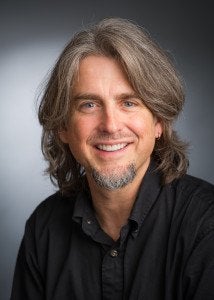June 24, 2013 — John Quackenbush, professor of computational biology and bioinformatics in the Department of Biostatistics, has received a White House Open Science Champion of Change award in recognition of his efforts to ensure that vast amounts of genomic data are available, accessible, and useful. He was one of 13 people across the nation to be honored at a June 20, 2013 ceremony at the White House.
The Champions of Change program was launched as part of President Obama’s Winning the Future Initiative, which highlights individuals, businesses, and organizations who make positive impacts on communities. Quackenbush and the other award winners were singled out for their efforts to make open sharing of scientific data a reality, which the Obama administration has deemed a priority for boosting scientific innovation.
Quackenbush was cited in a White House press release for the founding of the company GenoSpace in 2011 with colleague Mick Correll. GenoSpace develops advanced software tools for collecting, interpreting, and sharing clinical and genomic data to further biomedical research and facilitate personalized medicine.
In particular, Quackenbush was praised for the way GenoSpace has helped support the Multiple Myeloma Research Foundation’s (MMRF) CoMMpass study. CoMMpass is a five-year longitudinal study gathering genomic and clinical information from 1,000 multiple myeloma patients. GenoSpace worked closely with MMRF to develop software ensuring that all the data from the study is accessible and useful to anyone interested—scientists, doctors, or patients.
“I’ve long been an advocate of open access science,” Quackenbush said. “Everyone talks about the importance of big data, but it’s not useful if the only people who can use it are specialists. We wanted to make sure that anybody with access to big data would be able to do something with it. It’s like crowdsourcing—the more people who are looking at the data, the more likely it is that someone will find something interesting and relevant.”
He added, “Receiving this award was a tremendous honor, but it reflects not just on me, but on all the people and groups I’ve worked with over the years who have been in favor of open science.”
